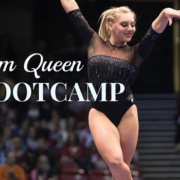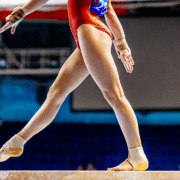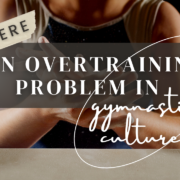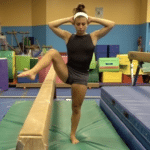Advice to College Gymnasts from Sam Peszek, Jake Dalton, Bridget Sloan, Danusia Francis, and Dave Durante
I’ve been working on this project for a long time, and I’m so pumped that it’s finally ready for everyone to check out.
If I’m being honest, I had a love-hate relationship with my college gymnastics career. On one hand, it provided me with four of the most incredible years of my life. It also gave me some of my best friends and memories to date.
Being on a college gymnastics team gave me a lot of characteristics I carry with me now as a Sports Physical Therapist, gymnastics coach, strength coach, and business owner. I will be forever grateful for that.
At the same time, man was brutal.
Physically, my teammates and I were hanging on by threads by our senior year. I won’t go through the details, but there were quite a few SLAP and rotator cuff tears that developed, knees that probably should have had surgery, and more than a few “nagging pains” that we casually overlooked telling our trainers about. (100% our fault, and we were idiots for not speaking up.) We were literally tape, ice, and Ibprophen factories by the end of our senior season. Given a lot of this did probably snowball starting in JO/high school years, college was a different beast to go through.
Emotionally, we all sacrificed an insane amount to train and compete. Springfield College is the only Division 3 program in the country, meaning that because there are so few schools with men’s gymnastics we had to compete against all Division 1 schools. We had to quadruple our efforts just to be in the ballpark with most teams when competing. I’m proud to say that we did beat some big Division 1 teams. I’ll also be honest saying I didn’t compete much till senior year, but everyone’s efforts support for each other made it happen.
Mentally, my friends and I were all in demanding academic programs and often felt buried by the cumulative strain trying to balance training, school, and personal lives. Long bus rides doing homework, many nights staying in because we were in season, and many “why are we doing this again?” moments.
As I hope makes sense now, this is why I have my love-hate relationship with it. I love what it gave me, but look back and wonder if it could have come with less collateral damage.
Table of Contents
My New College Gymnastics Survival Guide
I have always wanted to help college gymnasts more specifically, just because it’s so different than any other area of gymnastics training or competition.
So, I spent a few months reaching out to some of the people I know who have been through the highest level of collegiate gymnastics, or who have worked in a professional role of college gymnastics. I took their responses to questions I asked, combined it with the latest science on sports performance, and then packaged it all together in easy to read tips.
What came out was not only an insane amount of great advice but also my new resource “The College Gymnastics Survival Guide” which you can now download for free here:
Download My New
College Gymnastics Survival Guide!

Training and competition advice from NCAA Division 1 Gymnasts
Nutrition, Mental Health, and Recovery Advice from Expert Gymnastics Medical Providers
Additional PDF Downloads, Worksheets, and Free Training Resources
The guide has lots of great info inside, but I wanted to the biggest highlights with everyone in this blog post series.
In the first parts , I wanted to share the answers that athletes gave me to the following questions:
-
What are 3 of the most important tips you can give college gymnasts to perform well and stay healthy in season?
-
What is a mistake you made in your college gymnastics career that if you could go back and do over you would?
-
What were your useful ways for managing time and stress in season?
-
What is one resource that really helped you during college gymnastics (podcast, book, certain professional like sports psych, etc)
Remember, all of these blog posts are inside the complete guide you can download above. Without further ado, here are the first few sets of advice from
- Sam Peszek (UCLA 2010 – 2015),
- Dave Durante (Standford Alum 1998-2002, Stanford National Championship Coach)
- Jake Dalton (Oklahoma 2009-2012)
- Bridget Sloan (Florida 2012 – 2016)
- Danusia Francis (UCLA 2012 – 2016)
Sam Peszek
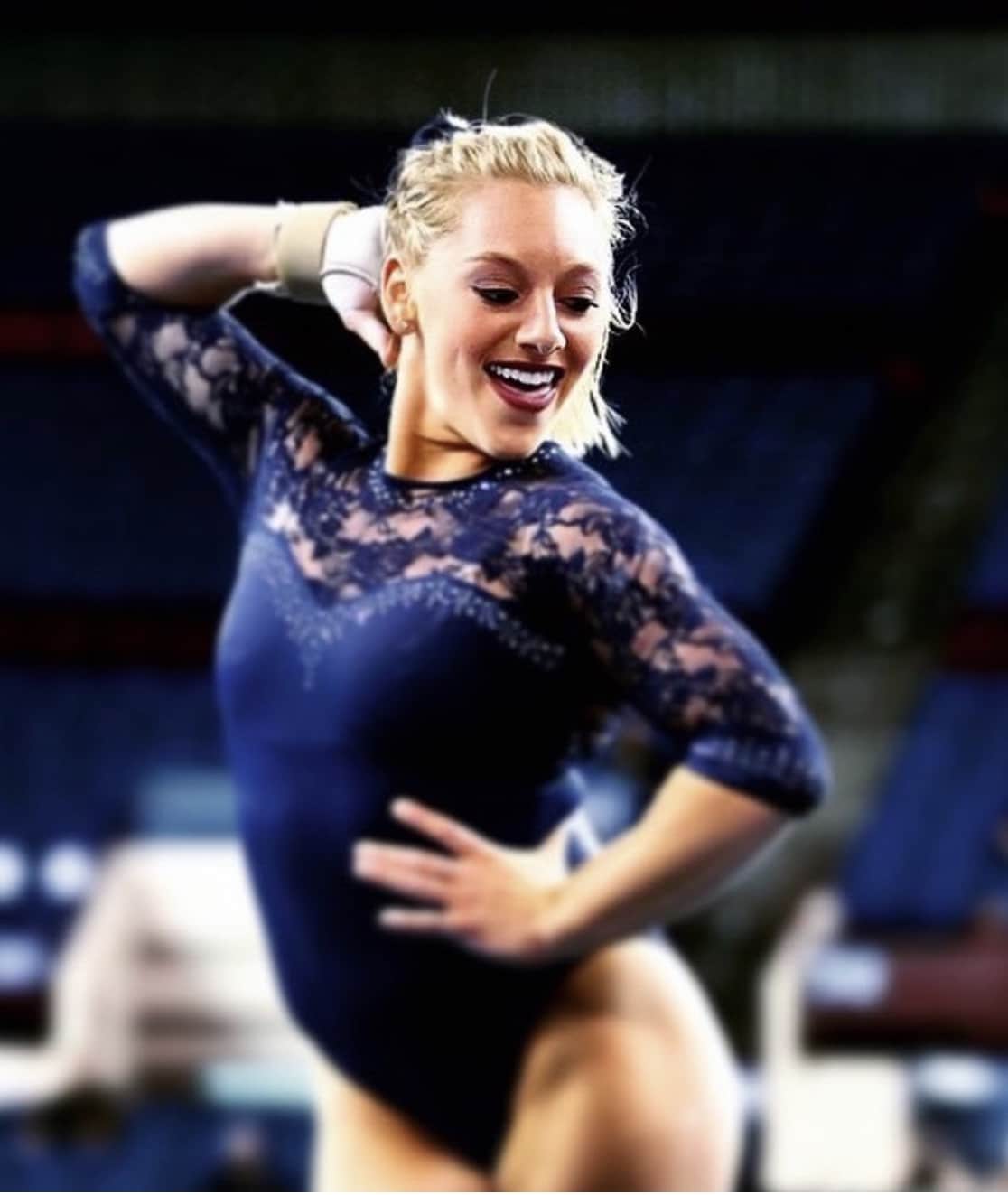
UCLA 2010 – 2015
3 time NCAA Champion
17 time All-American
Olympic Silver medalist
Instagram Name – @SamanthaPeszek
Twitter Handle – @SamanthaPeszek
What are 3 of the most important tips you can give college gymnasts to perform well and stay healthy in season?
- “Take ownership of your fitness – know what foods your body needs and how much conditioning your body needs. I had to do way more cardio than some girls on my team.
- Be a 24-hour athlete – For example, make sure you get enough sleep (even though this is tough in college). I definitely felt more susceptible to injuries and sickness when I didn’t get enough sleep. Also, doing gymnastics when you’re not clear headed is always risky!
- Be overly prepared- with homework, getting in routine shape, figuring out when you can have fun and relax are just as important too! I always felt like if I wasn’t prepared then I was really behind and stressed out.”
What is a mistake you made in your college gymnastics career that if you could go back and do over you would?
“Trying to do too much my freshman year. It’s such a learning year, but I definitely “burned the candle at both ends” my parents would say and felt like I was permanently exhausted, always sick, and playing catch up with everything. My FOMO was bad!!! haha”
What were your useful ways for manage time and stress in season?
“Doing as much homework as possible before leaving for meets and studying on planes. It made me feel productive in school and on meet day I could totally compartmentalize and focus on just gymnastics. Also, always having healthy snacks around and a water bottle with me at all times!”
What is one resource that really helped you during college gymnastics (podcast, book, certain professional like sports psych, etc)
“Hmmm.. I think it changed year to year in terms of what was motivating me that season. I wish I was into podcasts in college and I didn’t have any time to read books that weren’t school related…. this isn’t really a resource, but I love quotes, so I would find good ones that resonated with me and constantly remember them when something got tough. I would visualize and set short-term goals too for the 3 categories of my life: school, gymnastics, personal life.”
Dave Durante 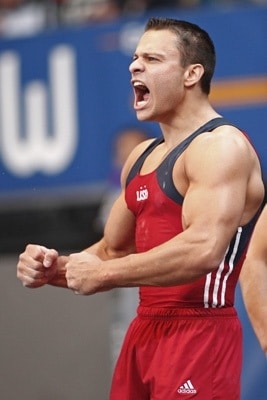
Stanford University 1998-2002
NCAA All American, US National AA Champion,
World Team Member, Olympic Team Member, Stanford Assist. Coach (NCAA Champions 2009)
Instagram Name – @davedurante
Twitter Handle – @DaveDurante1
Website – www.powermonkeyfitness.com
What are 3 of the most important tips you can give college gymnasts to perform well and stay healthy in season?
- “The NCAA season can be very long and draining. Working with your coaches to ensure a training plan that allows for you to peak towards the end of the season is critical. The objective should be to reach your physical, mental, and emotional peak when it counts the most.
- Take advantage of the resources outside of the gym that all colleges have available to their student athletes. Nutritionists, doctors, physical therapists, strength coaches, sports psychologists, etc. They are there to help you reach your optimal performance. I wish I would have taken more advantage of this when I was competing in college. Looking back, it was a missed opportunity to maximize my training.
- SLEEP!! This might be the hardest thing to do as a college student, but it can make a world of difference in terms of recovery and longevity through the season. Most college student athletes don’t make sleep a priority, but it can make an enormous difference when trying to stay healthy through a whole NCAA season.”
What is a mistake you made in your college gymnastics career that if you could go back and do over you would?
“My diet was terrible. I wish I had taken a closer look at what I was eating on a regular basis. There wasn’t as much of an emphasis on diet when I was in college and I know it had a negative impact on my training and overall recovery.”
What were your useful ways for you to manage time and stress in season?
“I was fortunate to have learned strong time management skills early on. In fact, I think most gymnasts learn to time manage well at a young age since we are normally juggling so many things at the same time when growing up. One tool I used, and still use today, to help time manage is to make prioritization lists. These lists can help focus the limited time/energy we have each day to what is most important.
One of the things I did to help with the stress of training was to make friends away from the gym to help create a separation between the gym and the outside world. While my closest friends in the world are my college teammates, it was critical for my overall stress levels and sanity to be able to have friends who knew nothing of gymnastics so I could shut that part of my brain off for a little while each day.”
What is one resource that really helped you during college gymnastics (podcast, book, certain professional like sports psych, etc)
“I had some major injuries in college (my first day freshman year I tore my ACL, MCL, Meniscus) so the medical staff at Stanford played a huge role in getting me back both physically and mentally. The doctors and PT’s that I worked with on a daily basis were incredibly supportive and actually were one of the reasons why I wanted to pursue a major in sports medicine.”
Jake Dalton
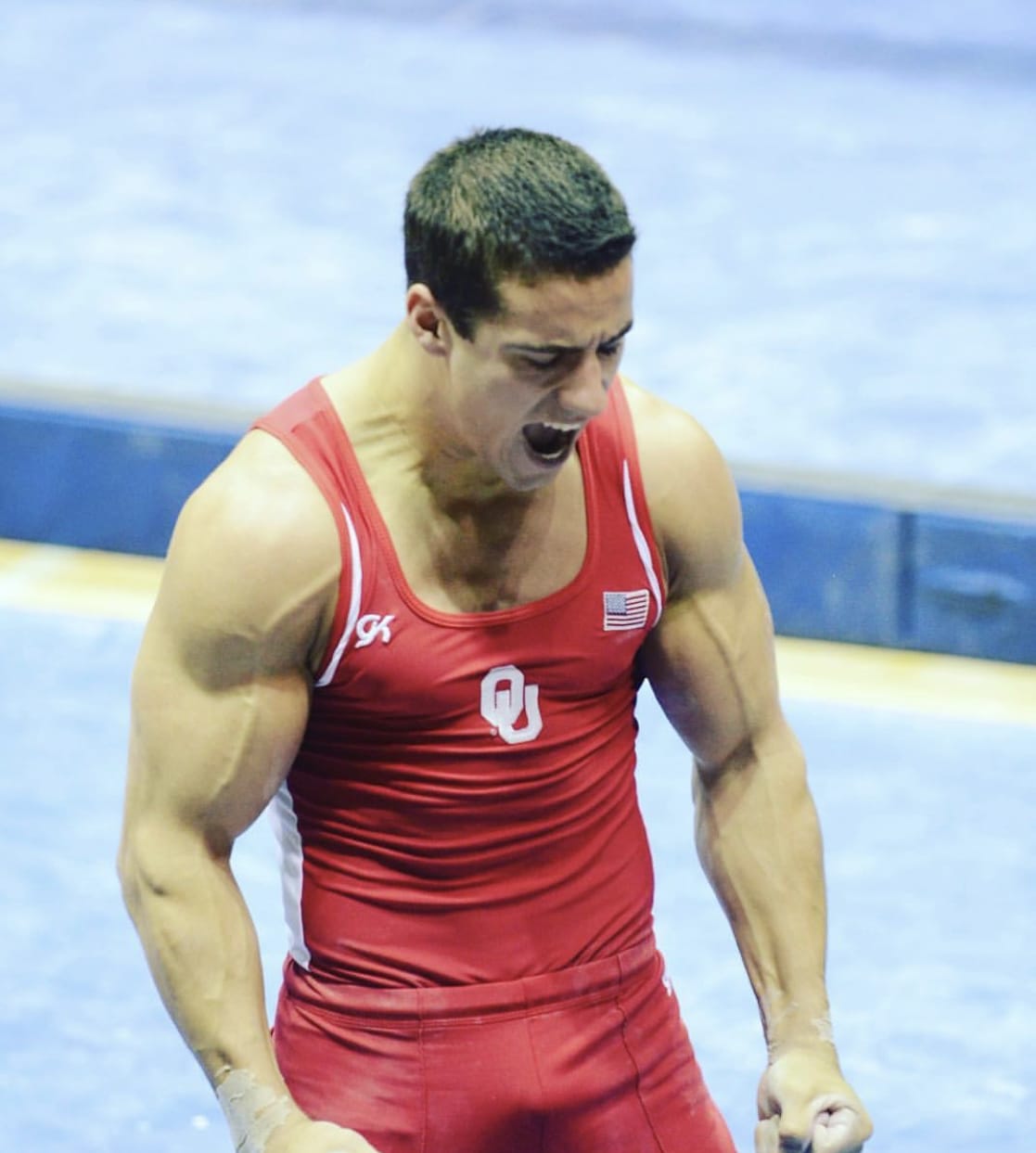
Oaklahoma 2009-2012
4 Time NCAA Champion. 4 Time World Medalist. 2 Time Olympian.
Instagram Name – @Jake_dalton
Twitter Handle -@Jake_dalton
What are 3 of the most important tips you can give college gymnasts to perform well and stay healthy in season?
“My three tips would be
1. Don’t sacrifice sleep
2. Focus on your nutrition
3. Keep training and recovery consistent all the time even when traveling.”
What is a mistake you made in your college gymnastics career that if you could go back and do over you would?
“I would go back to Freshman year and focus more on nutrition. It wasn’t until later when I really dug into the nutrition world and studied what was best for me.”
What were your useful ways for manage time and stress in season?
“I would just make sure I planned ahead. I would ask professors if there was anything I could do to catch up and get ahead or I would just make sure I got all my school work done as soon as possible so I wouldn’t have to stress about it when we traveled. Not having to worry about school as much as possible was huge for me. So I did my best to not procrastinate.”
What is one resource that really helped you during college gymnastics (podcast, book, certain professional like sports psych, etc)
“I’m not sure if you would count this but can I use Teammates? Haha my teammates were everything. They were family. They were the ones you went through the hardest parts of training together and kept each other in it for the same reasons. Everyone wanted to win and we all went through the training to be the best we could. I relied on my teammates just like I hoped they could rely on me. During routines we screamed for each other, when we had a bad day we had each other to pick us up. My teammates were huge in my training.”
Bridget Sloan
Florida 2012-2016
9x NCAA Champion, Perfect 10 on All 4 events, 2x Honda Award Winner
Instagram Name – @bridgetsloan
Twitter Handle – @bridgetsloan
What are 3 of the most important tips you can give college gymnasts to perform well and stay healthy in season?
“1. You know your body better than anyone. You know what is best for it and what’s best for YOU to be in the best shape/mental state/and overall happiness. I had an incredible bond with my college coaches and when I wasn’t feeling my best I spoke up about it. Which leads me into my next tip.
2. Speak up. As athletes especially gymnast we tend to not want to admit something hurts because that means we aren’t tough or we are scared…NOT TRUE. Speak up about how you are feeling, especially when it will affect your practice.
3. Leave the outside world outside the gym. There are things in this world we can control and there are things we can’t, control the controllables. When I walked into the gym I was a gymnast and when I walked out I was a student athlete, don’t let outside thoughts and things you can’t control affect your ability to be the best athlete you can be.”
What is a mistake you made in your college gymnastics career that if you could go back and do over you would?
“I feel very lucky to admit that I wouldn’t change a thing. The heartbreaks from injuries made me stronger, the loses made me want to get better, and the experience shaped who I am today.”
What were your useful ways for you to manage time and stress in season?
“Time management is honestly a skill you HAVE to have as a student-athlete. I had no shame in wanting a tutor for every class, I actually ALWAYS requested to have one. That being said I always scheduled time to meet before a travel trip so that I’m the trip I felt confident studying and turning homework in. Always plan to have homework to do, and if you don’t then work ahead.”
What is one resource that really helped you during college gymnastics (podcast, book, certain professional like sports psych, etc)
“I actually saw a sports psych and it sounds crazy but it was a life saver for me. I think sometimes sports psychs get a bad rep because that means “you have issues” or “you aren’t mentally tough” again not how it is. I saw him to help me get out of my stubborn thoughts (I know me stubborn?!) I also read “The Energy Bus” before every season….its an awesome self help book that I highly recommend to anyone!”
Danusia Francis
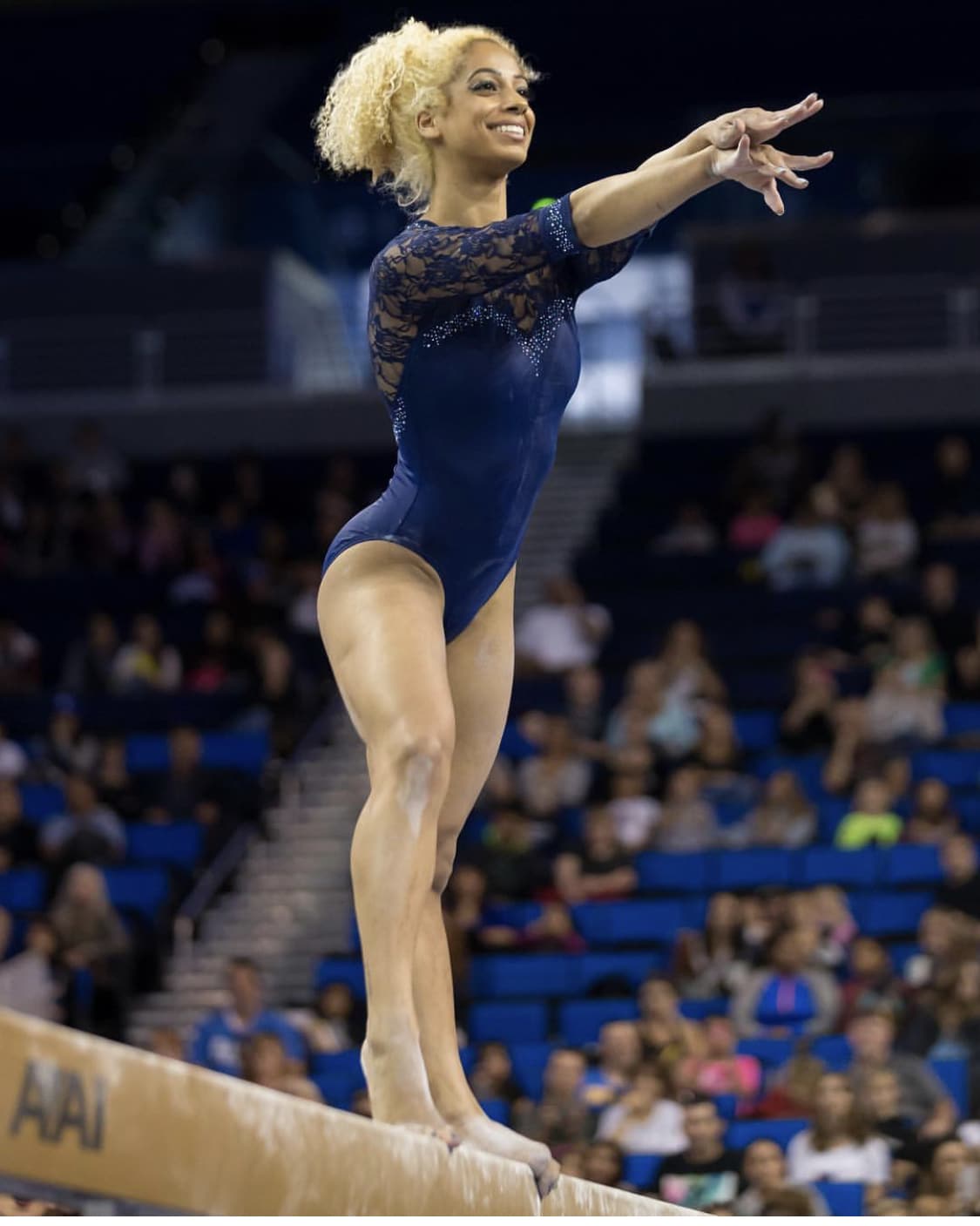
UCLA 2012-2016
NCAA Balance Beam Champion 2016, 6 Time All American
Instagram Name – danusiafrancis
Twitter Handle – danusiafrancis
What are 3 of the most important tips you can give college gymnasts to perform well and stay healthy in season?
“1) Figure out your best methods for recovery. They might be different from your team mates and that’s ok. It could be light cardio on your days off or extra naps or specific foods or drinks that help you. Whatever it is, make it part of your routine.
2) I always found not focusing too far ahead helpful as that can be really overwhelming. Take each meet as it comes and don’t stress about the ones that aren’t that week.
3) Have fun, it sounds cliché but competing every week can take its toll physically and mentally. So yes take it seriously but also relax and have fun with it.”
What is a mistake you made in your college gymnastics career that if you could go back and do over you would?
“The only time I fell during my dismount on beam (sideways side arial into full twist off the side) during my college career was junior year at our first competition of the season. I felt really embarrassed and quickly saluted and ignored the cameras. Miss Val told me “Nush you make that dismount look so easy, I’m glad people got to see you fall and truly appreciate how difficult that dismount is” and now if I could do it over and something I have taken with me, is to own your mistakes. In a sport like gymnastics where we are performing dangerous skills if something goes wrong then it goes wrong it’s not the end of the world. You shouldn’t be embarrassed or ashamed because even if it feels like it no one is looking at you like your total rubbish, if you do make a mistake. Shrug it off, own it and learn from it!”
What were your useful ways for manage time and stress in season?
“I’m a huge list maker. It just keeps me in check. I have always made lists for everything. So a to-do list each day even with timings if I had a really hectic day, packing lists every away meet etc. kept me on schedule and stress free.”
What is one resource that really helped you during college gymnastics (podcast, book, certain professional like sports psych, etc)
“The college gymnastics fans kept me motivated each week, it’s a huge support system that makes all your hard work feel appreciated. As well as making sure you utilise all that is available to you. The trainers, facilities, tutors and advice from older team mates.”
Remember, if you want to dive into everything above and more in the College Gymnastics Survival Guide, you can check it out for free here
Download My New
College Gymnastics Survival Guide!

Training and competition advice from NCAA Division 1 Gymnasts
Nutrition, Mental Health, and Recovery Advice from Expert Gymnastics Medical Providers
Additional PDF Downloads, Worksheets, and Free Training Resources
Take Away Patterns From All Gymnasts
- SLEEP. This is hard, but not impossible in college. It’s just about making choices and having habits that are in line with your goals.
- Seek out eduation on nutrition and fueling for Training / Performance. You need gas in the engine if you want to drive cross country.
- Know yourself well, don’t assume you will respond to training or recover like your teammates
- Don’t be afraid to speak up. Both about physical and mental issues. The worst thing you can do is try to ignore something, let it fester, and then have it blow up on you and ruin your season.
- Be a master of your schedule. Plan in advance, time, make lists, talk to professors ahead of time, block schedule for work to be done.
- Be proactive and make choices to support your goals. There is a lot of opportunity for distraction and wasted time in college. By all means have fun, but make sure you write out and follow habits that match your priorities.
- Don’t dwell and fail upward. College gymnastics is beyond challenging and will come with inevitable highs and lows. Carrying all the negatives with you is really gonna become challenging.
- Lean on your teammates and available resources. The people who are in the trenches with you know best. Also take advantage of all the resources at your school like Athletic Trainers, Physical Therapists, Doctors, Nutritionists, Mental Health Professionals, Academic Support, and anyone else.
Hope this helps! I can’t wait till next week, so tomorrow I’ll be releasing Part 2 of this blog which has the best nutrition, recovery, and mental health advice from some friends of mine who are amazing medical providers. Be on the look out for that!
– Dave
Dr. Dave Tilley DPT, SCS, CSCS
CEO/Founder of SHIFT Movement Science




